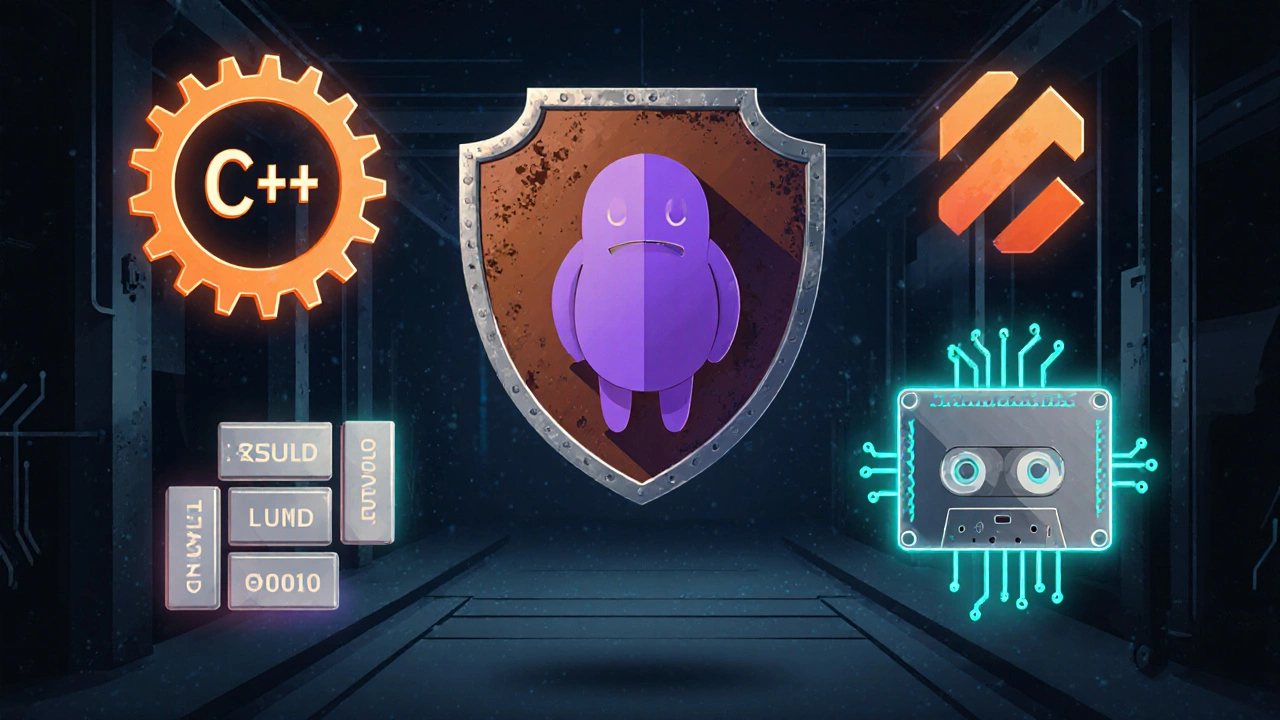Programming Language Difficulty Comparison Tool
Compare Language Difficulty Factors
Select up to two programming languages to compare their difficulty across key factors mentioned in the article.
Comparison Results
Ever wondered which language will make you feel like you’re wrestling a code‑monster? If you’re hunting for the hardest programming language out there, you’ve landed in the right spot. Below we break down what makes a language tough, list the usual suspects, compare their pain points, and give you a survival guide so you can tackle any beast without losing your sanity.
What Makes a Language Hard?
Difficulty isn’t a magic property; it’s a mix of several factors. When you hear people debate “the hardest language,” they’re usually weighing these attributes:
- Syntax density - How many symbols do you need to write to express a simple idea?
- Abstraction level - Does the language hide low‑level details or expose them?
- Memory management model - Do you manage pointers yourself or does a garbage collector do the work?
- Type system complexity - Are types inferred, strict, or do you need to explicitly annotate everything?
- Standard library and tooling - Is there solid documentation, a package manager, and a debugger?
- Community and learning resources - Can you find tutorials, forums, and mentors without digging through archives?
Each of these dimensions can turn a language from “just a hurdle” into an all‑day obstacle course.
Top Contenders for the Hardest Language
Below are the languages that most developers point to when they talk about sheer difficulty. The list isn’t exhaustive, but it covers the most common pain points.
C++ is a statically‑typed, compiled language known for its powerful abstractions and manual memory management. Its steep learning curve comes from intricate syntax, undefined‑behavior pitfalls, and a massive standard library that rewards deep mastery.
Rust is a systems programming language that guarantees memory safety without a garbage collector. The ownership and borrowing model, while brilliant for preventing bugs, forces you to think about lifetimes at a level most languages never require.
Haskell is a pure functional language with lazy evaluation and a strong static type system. Its emphasis on immutability, monads, and type-level programming can feel alien to anyone accustomed to imperative code.
Brainfuck is an esoteric language consisting of only eight commands, designed to be as minimalistic as possible. Despite its tiny instruction set, writing anything useful requires managing a raw memory tape manually, making it a nightmare for readability.
Assembly language is a low‑level language that maps almost one‑to‑one with CPU instructions. You must handle registers, calling conventions, and hardware quirks directly, which leaves little room for error.
Other languages often mentioned include Prolog (logic programming with backtracking), Scala (mixes OOP and functional paradigms with a complex type system), and Lisp (code‑as‑data philosophy requiring heavy use of parentheses). Each introduces its own unique mental models.
Comparison Table
| Language | Primary Challenge | Typical Use‑Case | Learning Curve (1‑10) |
|---|---|---|---|
| C++ | Manual memory management + complex syntax | Game engines, high‑performance apps | 8 |
| Rust | Ownership & borrowing model | Systems programming, safe concurrency | 7 |
| Haskell | Pure functional concepts & laziness | Academic research, compilers | 9 |
| Brainfuck | Extreme minimalism, unreadable code | Teaching concepts of Turing completeness | 10 |
| Assembly | Hardware‑level details, no abstraction | Embedded systems, bootloaders | 9 |
| Prolog | Logic programming paradigm | AI rule‑based engines | 8 |

How to Survive Learning a Hard Language
Even the toughest language can become manageable if you follow a structured approach.
- Start with the fundamentals. Before you write a full program, master the basic syntax, data types, and control structures. For C++ and Rust, this means understanding compilation and linking.
- Use a good IDE or tooling. Modern editors like VS Code, CLion, or Rust‑Analyzer provide real‑time diagnostics that catch mistakes early.
- Read, then write. Study well‑commented sample code. For Haskell, the “Learn You a Haskell” tutorial is a classic; for Assembly, the Intel manuals are essential.
- Practice deliberately. Solve tiny problems that target the language’s pain points. For ownership, try writing a struct that owns a heap‑allocated vector in Rust. For Brainfuck, implement a simple “Hello World” and then a loop.
- Leverage community resources. Join subreddits, Discord servers, or mailing lists. The Rust community, for example, is known for being beginner‑friendly despite the language’s complexity.
- Debug with purpose. Set breakpoints, watch memory, and step through code line by line. Seeing how a pointer changes in Assembly can demystify the whole process.
- Document your learning. Keep a personal wiki of quirks, gotchas, and patterns you discover. When you revisit a concept later, you’ll have a ready reference.
When (and Why) to Choose a Difficult Language
Choosing a hard language isn’t just about ego-it can be a strategic decision.
- Performance‑critical systems. If you need deterministic latency, languages like C++ or Rust give you fine‑grained control.
- Safety guarantees. Rust’s compile‑time checks eliminate whole classes of bugs, making the initial learning cost worth the later reliability.
- Academic or research goals. Haskell’s type system lets you prototype mathematically rigorous algorithms that would be cumbersome elsewhere.
- Career differentiation. Few developers master Assembly or Prolog; having that skill can set you apart for niche roles.
- Personal growth. Tackling a tough language trains problem‑solving habits that translate to any tech stack.

Quick Checklist Before You Dive In
- Do you have a clear goal (e.g., build a game engine, write safe concurrent code)?
- Is a robust IDE or compiler toolchain available for your platform?
- Have you earmarked time for daily practice (30‑60 minutes at least)?
- Do you have access to a supportive community or mentor?
- Are you prepared for a steep initial learning curve before the payoff?
If you answered “yes” to most of these, you’re ready to start the adventure.
Frequently Asked Questions
Is there a single “hardest” programming language?
Hardness is subjective. It depends on your background, the problem domain, and the criteria you prioritize (syntax, memory management, type system, etc.). Languages like Brainfuck or Assembly rank high on pure syntactic difficulty, while Haskell tops the list for abstract functional concepts.
Can I learn a hard language without a computer science degree?
Absolutely. Many self‑taught developers master Rust or C++ using online courses, tutorials, and community mentorship. The key is consistent practice and leveraging quality resources.
What’s the best first language before tackling a hard one?
Start with a language that introduces programming concepts without overwhelming syntax-Python or JavaScript are common choices. Once comfortable, transition to a harder language that aligns with your goals.
How long does it usually take to become proficient in a difficult language?
Time varies widely. For Rust, many report 3‑6 months of regular study before they feel comfortable writing production code. Assembly may take a year or more to use confidently in real projects.
Are there any shortcuts or cheat‑sheets that help?
Cheat‑sheets for syntax, memory model diagrams, and common idioms are priceless. The Rust Book’s “The Ownership System” chapter, the C++ Core Guidelines, and Haskell’s “Typeclassopedia” are all freely available and highly recommended.







0 Comments